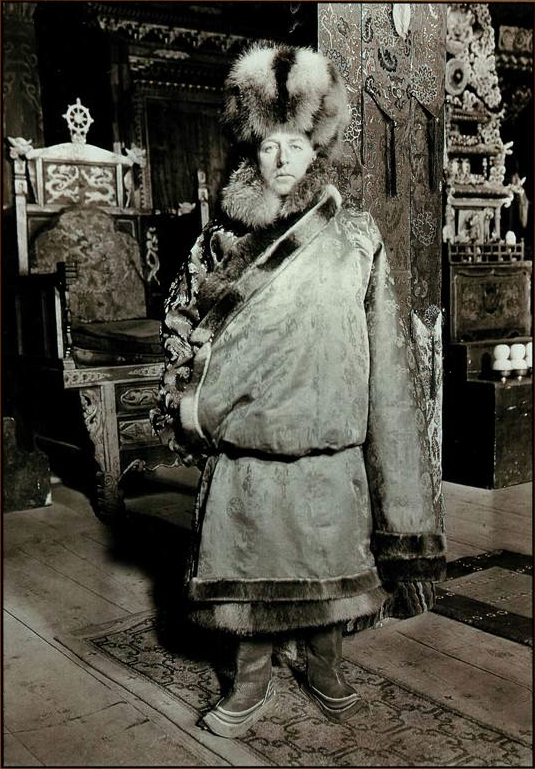A King in China
Joseph Francis Rock, botanist, explorer and cultural scientist, was one of the last great adventurers of the 20th century, exploring regions never before seen by Europeans and travelling like royalty. With his photographs and film he created an unparalleled visual documentation of life in western China in the 1920s and 30s, and he was instrumental in saving the Naxi culture from the destruction wrought by the Communists in later years.
Rock was a complicated man, proud, self-made, extraordinary, imperfect, and a loner. Setting out for months at a time, he would travel like royalty. His baggage included tents, a folding bed, a table and chairs, table linen and china, and even a portable rubber bathtub. The caravan would often include up to 26 mules and 17 men, escorted by 190 soldiers with rifles to ward off the bandits who preyed on travellers in China’s backcountry in the 1920s. He himself would head the caravan travelling on horseback, except when he visited a local ruler when he would be carried in a sedan chair; when the four porters put it down the figure who alighted would be wearing a white shirt, tie and jacket, and the many astonished peasants would believe him to be a foreign prince. “You’ve got to make people believe you’re someone of importance if you want to live in these wilds,” he once said.
Rock was born in Vienna, the son of a nobleman’s servant who determined that the boy would become a priest. His mother died when he was six and Rock developed into an introverted adolescent who decided that he wanted to travel. He prepared himself by studying exotic languages under his bed covers at night when he was supposed to be sleeping. After his graduation from school, he defied his father and escaped from Vienna. One day he signed on as a cabin steward aboard a passenger ship bound for New York and arrived there in 1905. Working as a dishwasher and suffering from attacks of tuberculosis, he haphazardly made his way to Hawaii where he landed penniless in 1907. Within a few weeks he found a position teaching Latin and natural history in a secondary school in Honolulu. He had no university degree and so gave himself the title of Doctor which nobody questioned. Rock’s obligation to his natural history students forced him to investigate the flora of Hawaii. He discovered that he liked working alone outdoors and slowly his health improved. For the next decade he gave botany his undivided attention and became the unchallenged authority on the flora of the Hawaiian Islands.
As an agricultural explorer in China, Rock lived in wild and troubled provinces in a chaotic nation. He witnessed civil wars, tribal wars, provincial wars, a world war, and a national revolution, not to mention the random savagery of bandits who plundered the Chinese countryside. Having established himself in a village near Lijiang in western Yunnan, Rock set out to explore the Tibetan borderlands, areas little known to the Western world. On his expeditions he got to know Kings, Regents and Warlords, always looking for his own personal Shangri-La. He found it amongst the Naxi, an ethnic minority in Southwest China. He was fascinated by their unique religious pictographic script and started work on his magnum opus, an encyclopaedic dictionary of the pictographic language of the Naxi religious texts and a description of a culture on the verge of extinction. His pioneering work amongst the Naxi created an awareness of their culture for the first time in the West and he was instrumental in saving their culture from the destruction of the Cultural Revolution yet to come.
Rock spent his last few weeks in China under a communist regime. Though no one laid a hand on Rock or his belongings, he was clearly unwanted. The work on his dictionary had anyway come to a halt as the Naxi priests vanished overnight, Rock’s interpreter with them. Some went underground and others were killed. Naxi men who had been Rock’s servants for years were jeered in public and labelled “imperialist lackeys”. In 1949 he returned to Hawaii to complete his encyclopaedia. Rock had hoped to see it published by his 79th birthday on the 13th of January 1963, but unfortunately a month before its publication he died of a heart attack at home on the 5th of December 1962, surrounded by Naxi pictographs.
Director: PAUL BENJAMIN HARRIS
Producer: PEOPLE AND PLACES
Associate Producers:
Carmen Cobos, Cobos Films BV, Oliver Koytek, Real and Fiction GmbH, Vincent Lucassen, Wildart Film.
Credits: Photography Björn Faber / Sound Hao Yuejun / Editor Timothy McLeish & Kawe Vakil / Music Paul Rabiger, Enrico Caruso
A People and Places production in co-production with Cobos Films and NPS Television Netherlands
Made with the participation of the Dutch CoBO Fund, the Filmfund Wien, Austria.
Sold to: SBS Australia, History Television Canada, ORF Austria
Versions: Chinese and English with Dutch subtitles, colour and black & white, 52 and 90 minutes.
Copyright: People and Places / Ryninks Holding BV / NPS 2003
